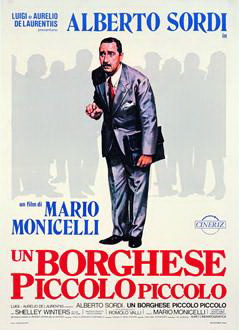| An Average Little Man (Un borghese piccolo piccolo) | |
|---|---|
 Italian film poster | |
| Directed by | Mario Monicelli |
| Written by | Vincenzo Cerami Sergio Amidei Mario Monicelli |
| Based on | Un borghese piccolo piccolo by Vincenzo Cerami |
| Produced by | Aurelio De Laurentiis Luigi De Laurentiis |
| Starring | Alberto Sordi Shelley Winters Romolo Valli Vincenzo Crocitti |
| Cinematography | Mario Vulpiani |
| Edited by | Ruggero Mastroianni |
| Music by | Giancarlo Chiaramello |
| Distributed by | Cineriz |
Release date |
|
Running time | 118 minutes |
| Country | Italy |
| Language | Italian |
An Average Little Man (Italian : Un borghese piccolo piccolo, literally meaning a petty petty bourgeois, also known in English as A Very Little Man) is a 1977 Italian drama film directed by Mario Monicelli. It is based on the novel of the same name written by Vincenzo Cerami. The movie mixes "Italian-Style Comedy" (commedia all'italiana) with psychological drama tragedy. The film was an entrant in the 1977 Cannes Film Festival. [1] In 2008, the film was included on the Italian Ministry of Cultural Heritage’s 100 Italian films to be saved, a list of 100 films that "have changed the collective memory of the country between 1942 and 1978." [2]